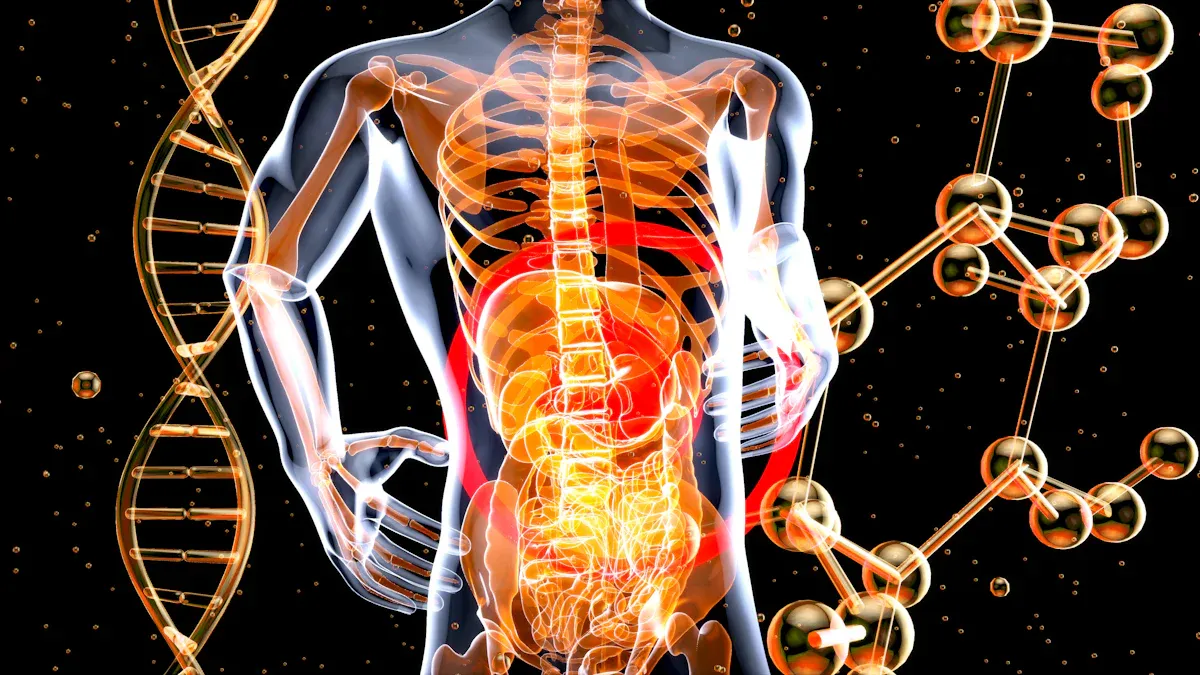How Long Until Vitamins Start Working for You
Table of Contents

You might wonder how long do vitamins take to work after you begin taking them. Water-soluble vitamins start working faster, sometimes in just a few days. Fat-soluble vitamins start working over weeks or months. Your body’s needs, how well you absorb nutrients, and how often you take supplements all play a role. Stay patient and consistent. If you ask, “how long does it take for vitamins to work?” remember that results depend on you.
Tip: Track changes in your energy or mood to see when vitamins start working for you.
How Long Do Vitamins Take to Work

Water-Soluble vs. Fat-Soluble
You may notice that vitamins start working at different speeds depending on their type. Water-soluble vitamins, like vitamin C and the B-complex group, move directly into your bloodstream. Your body absorbs them quickly, and you do not need fat or bile for this process. Fat-soluble vitamins, such as vitamins A, D, E, and K, need dietary fat and bile salts to be absorbed. These vitamins travel through your lymphatic system before reaching your blood.
Here is a table that shows the main differences:
| Aspect | Water-Soluble Vitamins | Fat-Soluble Vitamins |
|---|---|---|
| Absorption | Absorbed directly into the bloodstream with water | Absorbed along with dietary fats |
| Storage | Not stored; excess excreted in urine | Stored in liver, fatty tissue, and muscles |
| Vitamins Included | Vitamin C and B-complex (B1, B2, B3, B6, B12, folate) | Vitamins A, D, E, K |
| Duration in Body | Not stored; require frequent replenishment | Can be stored for months (up to 6 months) |
| Risk of Toxicity | Low, due to excretion of excess | Higher, due to accumulation in fat stores |
Water-soluble vitamins leave your body through urine if you take too much. You need to consume them regularly. Fat-soluble vitamins stay in your body for longer periods, so you do not need to take them as often. If you take too many fat-soluble vitamins, they can build up and cause problems.
Tip: Take fat-soluble vitamins with meals that contain some fat to help your body absorb them better.
Vitamin Timelines
You might ask, “how long do vitamins take to work?” The answer depends on the vitamin and your body’s needs. Water-soluble vitamins usually show effects faster. For example, vitamin B6 can start to show benefits in about one month if you have a deficiency. Vitamin B12 may take several months to improve symptoms in humans, but animal studies show effects in one to four weeks. There is less clear data for vitamin C and vitamin D, but most people notice changes from water-soluble vitamins within days to weeks.
Here is a table with timelines for some common vitamins:
| Vitamin | Timeline for Noticeable Effects | Notes |
|---|---|---|
| B6 | About 1 month | May reduce anxiety and improve mood in young adults |
| B12 | Several months (humans) | Faster in animals (1-4 weeks); helps with nerve health |
| C | Not specified | Timeline not clear from studies |
| D | Not specified | Timeline not clear from studies |
If you have a deficiency, you may notice that vitamins start working more quickly. People who lack certain nutrients, such as older adults, vegans, or those with absorption problems, often see faster and clearer results. If you are healthy and do not have a deficiency, you may not notice any changes, even after taking supplements for a long time.
Short-Term vs. Long-Term
You may wonder how long does it take for vitamins to work in the short term compared to the long term. Short-term effects, like increased energy or better mood, can appear within weeks if you have a deficiency. Long-term effects, such as improved heart health or lower cancer risk, may take years to show up and are harder to measure.
Clinical trials show that short-term benefits of vitamin supplementation are usually small or absent for healthy people. For example, studies found no major changes in health after taking multivitamins for a few weeks or months. Long-term studies, lasting seven years or more, show only modest benefits, such as a small reduction in cancer risk. Most healthy people do not see big changes in the short term, but correcting a deficiency can lead to important improvements over time.
Note: If you want to know how long it takes for vitamins to work, check your deficiency status and talk to your doctor. People with deficiencies see results faster than those who are already healthy.
What Affects How Fast Vitamins Start Working
Several factors affecting how fast they work can change your experience with vitamins. You might notice results quickly, or it may take longer. Understanding these factors that affect vitamin effectiveness helps you set realistic expectations.
Deficiency Status
Your starting vitamin levels play a big role in how soon you feel better. If you have a severe deficiency, you often see faster and more noticeable improvements. For example, people with very low vitamin D levels can experience significant gains in balance and walking ability after supplementation. The more severe your deficiency, the greater and quicker the change. Here is a table showing how deficiency severity impacts improvement:
| Severity of Deficiency | Group Size | Symptom Improvement | Timeline |
|---|---|---|---|
| Severe | 78 | Large improvement | 6-12 months |
| Moderate | 133 | Moderate improvement | 6-12 months |
| Sufficient | 159 | Little change | Stable |
Fatigue, brittle nails, and mouth ulcers are some symptoms that often improve first when you correct a deficiency.
Absorption and Diet
Your vitamin absorption rate depends on your diet and digestive health. Fat-soluble vitamins like D and E need dietary fat for proper absorption. Eating foods such as avocados, olive oil, or nuts with these vitamins helps your body use them better. Most people absorb fat-soluble vitamins well if they eat enough healthy fats. If you have digestive problems, absorption may slow down. Different supplements absorb differently. Liquid vitamins and sublingual sprays can enter your bloodstream faster than pills or gummies, but the overall vitamin efficacy depends on regular intake and your body’s needs.
Consistency
Consistency is one of the most important factors affecting how fast they work. Taking vitamins nearly every day keeps your nutrient levels steady. Most people who take supplements daily see better results than those who use them only sometimes. Frequent use—at least 21 days each month—almost eliminates nutrient gaps. Regular intake supports vitamin efficacy and helps your body maintain healthy levels. Skipping doses can lead to ups and downs in how you feel.
Tip: Set a daily reminder to help you stay consistent with your supplements.
Signs Your Vitamins Are Working

Physical Changes
You may wonder how you can tell if your vitamins are making a difference. Many people notice early signs in their body before any lab test. These changes often appear within days or weeks, depending on your current vitamin levels and the type of vitamin you take. Water-soluble vitamins, like vitamin C and B-complex, work quickly. You might feel more energy or see better skin in just a few days. Fat-soluble vitamins, such as vitamin D, take longer because your body stores them in fat.
Here is a table showing common early changes and when you might notice them:
| Vitamin | Early Physical Changes Reported | Typical Time Frame |
|---|---|---|
| Vitamin B6 | Increased energy and strength, improved mood, less neuropathic pain | 1-3 weeks |
| Biotin | Clearer skin, less hair loss, stronger nails | About 6 weeks |
| Vitamin D | More energy, better mood | 6 weeks to 4 months |
| Vitamin C | Improved skin health, mood, energy | 1-2 weeks |
| Vitamin B12 | Improved muscle weakness, increased energy | A few weeks |
You may start to see the effects as early as the first week, especially if your current vitamin levels were low before you began. Some people report better sleep, improved digestion, or a brighter mood. If you keep taking your vitamins as directed, you may notice stronger nails, healthier skin, and less hair loss over time.
Tip: Keep a journal to track changes in your energy, mood, and skin. This helps you notice small improvements as your current vitamin levels rise.
Lab Tests
Physical changes give you clues, but lab tests provide clear answers about your current vitamin levels. Doctors use blood tests to check if your vitamin supplementation works. These tests measure how much of a vitamin is in your blood. For example, vitamin D and B12 levels are easy to check with a simple blood draw.
Reliable lab tests use advanced methods like chromatography and immunoassays. Chromatography, such as High-Performance Liquid Chromatography (HPLC), separates and measures vitamins and their byproducts. Immunoassays offer quick results but may not always be as specific. Many labs use both methods to get the most accurate picture of your current vitamin levels.
- Common lab tests for vitamins include:
- Potency testing (checks vitamin strength)
- Purity testing (looks for harmful substances)
- Stability testing (makes sure vitamins stay effective)
- Contamination testing (checks for unwanted chemicals)
Doctors may recommend these tests if you have symptoms of deficiency or if you want to track your progress. Always talk to your healthcare provider before making changes to your supplement routine.
Tips for Getting Results
Best Practices
You can boost the benefits of your vitamins by following a few smart habits. Nutritionists recommend several steps to help your body absorb nutrients and improve vitamin efficacy:
- Pick supplements with highly bioavailable forms. For example, magnesium glycinate absorbs better than magnesium oxide.
- Take your vitamins with food, especially fat-soluble ones like A, D, E, and K. Food helps your body use these nutrients.
- Watch out for nutrient interactions. Some vitamins and minerals can block each other if you take them together. Space out your supplements if needed.
- Choose high-quality products from trusted brands. Good supplements contain what they promise and avoid harmful fillers.
- Pair nutrients for better absorption. For example, eat healthy fats with fat-soluble vitamins or take plant-based iron with vitamin C.
- Keep your gut healthy. Eat a balanced diet, exercise, sleep well, and manage stress. A healthy gut helps you absorb vitamins.
- Limit alcohol. Drinking too much can lower your body’s ability to absorb vitamins.
Tip: Ask your doctor for advice if you have health conditions that affect how your body uses vitamins.
Timing and Meals
When you take your vitamins matters. The best time depends on the type of vitamin and your daily routine. Water-soluble vitamins, such as vitamin C and B vitamins, work well in the morning or on an empty stomach. Fat-soluble vitamins, like D and E, absorb best with meals that contain some fat. For example, vitamin D absorbs better with a low-fat meal than with no meal or a high-fat meal. Multivitamins and prenatal vitamins also work best with food to prevent stomach upset.
Here is a table to help you decide when to take your vitamins:
| Vitamin Type | Best Time to Take | Extra Tips |
|---|---|---|
| Water-soluble | Morning or empty stomach | Avoid taking B12 with vitamin C |
| Fat-soluble | With meals containing fat | Morning for vitamin D |
| Multivitamins | With meals | Morning or afternoon |
| Iron supplements | Morning with vitamin C | Before food or coffee |
You do not need to worry about finding a perfect time of day. Consistency matters most. Take your vitamins at the same time each day to help your body build healthy levels.
Note: If you feel sick after taking vitamins, try switching the time or taking them with a small snack.
You may notice vitamins working in days or weeks if you have a deficiency, but full effects often take months. Many factors affect how fast you see results, such as the type of vitamin, your health, and how often you take them.
- Water-soluble vitamins work faster but need regular intake.
- Fat-soluble vitamins take longer and need fat for absorption.
- Consistency, diet, and supplement quality matter.
Always talk to your doctor before starting supplements. Track your progress, follow dosing instructions, and stay patient. Safe use helps you get the best results.
FAQ
How do I know if my vitamins are working?
You may notice more energy, better mood, or healthier skin. Some changes take weeks. Lab tests can show your vitamin levels.
Tip: Keep a journal to track how you feel each week.
Can I take all my vitamins at once?
You can take most vitamins together. Some work better with food. Iron and calcium may block each other, so take them at different times.
- Always read the label.
- Ask your doctor if you take many supplements.
What happens if I miss a dose?
Missing one dose usually does not cause problems. Take your next dose as planned. Do not double up.
Consistency helps your body get the most benefit from vitamins.
Do I need to take vitamins forever?
You may not need to take vitamins forever. If you eat a balanced diet, you can get enough nutrients from food. Some people need long-term supplements for health reasons.
Talk to your doctor before stopping any supplement.

Poseidon
Master of Nutritional Epidemiology, University of Copenhagen, Herbal Functional Nutrition Researcher
Focus: The scientific application of natural active ingredients such as Tongo Ali, Horny Goat Weed, and Maca to sexual health and metabolic regulation.
Core Focus:
Men: Use a combination of Tongo Ali (an energizing factor) + Maca (an energy reserve) to improve low energy and fluctuating libido.
Women: Use a combination of Horny Goat Weed (a gentle regulator) + Maca (a nutritional synergist) to alleviate low libido and hormonal imbalances.
Stressed/Middle-Aged Adults: This triple-ingredient synergy supports metabolism, physical strength, and intimacy.
Product Concept:
Based on traditional applications and modern research (e.g., Tongo Ali promotes testosterone-enhancing enzyme activity, and icariin provides gentle regulation), we preserve core active ingredients and eschew conceptual packaging—using natural ingredients to address specific needs.
Simply put: I'm a nutritionist who understands "herbal actives." I use scientifically proven ingredients like Tongo Ali, Epimedium, and Maca to help you make "sexual health" and "nutritional support" a daily routine.
